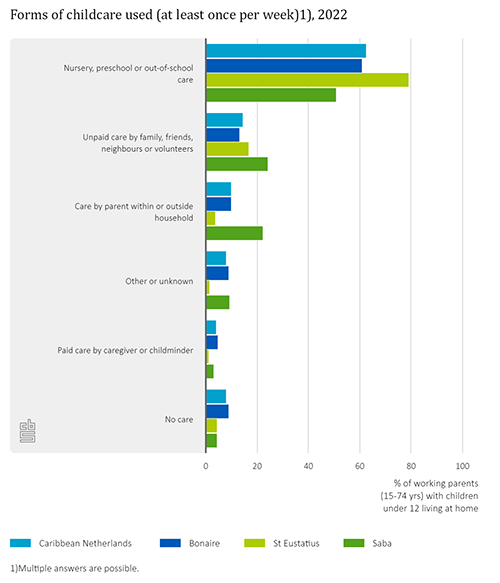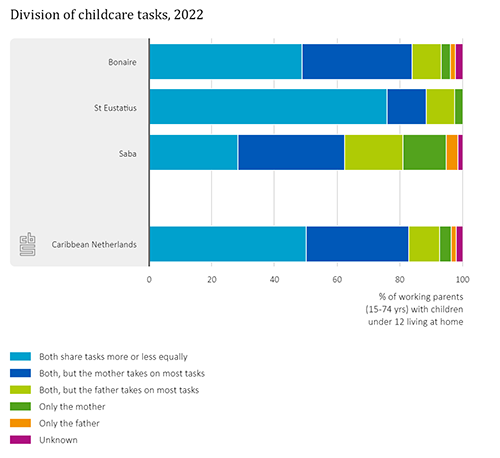Over 6 in 10 working parents in the Caribbean Netherlands with children under age 12 used formal childcare at least once every week in 2022. The children attended a nursery, preschool or out-of-school care. On average, 91 per cent of the parents aged 15 to 74 years with children under 12 were in employment. Statistics Netherlands (CBS) reports this based on new figures taken from the Labour Force Survey Caribbean Netherlands.

In 2022, there were more than 4,100 parents in the Caribbean Netherlands with children under 12 living at home; nearly 300 on Saba, nearly 3,300 on Bonaire, and over 500 on St Eustatius. Of the working parents with young children, 63 per cent made use of formal childcare, such as a nursery, preschool or out-of-school care, at least once per week. The highest share was seen on St Eustatius at 79 per cent, versus 61 per cent on Bonaire and 51 per cent on Saba.
A quarter of parents on Saba use childcare provided by family, friends, neighbours or volunteers
Instead of formal childcare, parents can also choose other or multiple forms of childcare. Fourteen per cent of the working parents with children under the age of 12 made use of unpaid childcare provided by family, friends, neighbours or a voluntary organisation. This was most common on Saba at 24 per cent; on St Eustatius and Bonaire, the respective shares were 17 and 13 per cent. Children on Saba (22 per cent) were also more likely to be cared for by a parent than on the other islands, either within or outside their own household (if the parents did not live together). Eight per cent used childcare less than once per week or not at all. This was true for more parents on Bonaire (9 per cent) than on Saba (4 per cent) and St Eustatius (5 per cent).
9 in 10 parents in the Caribbean Netherlands have paid work
The net labour participation rate of parents with children under 12 living at home was higher than average among the 15 to 74-year-old population of the Caribbean Netherlands (91 per cent versus 72 per cent). On Saba, 94 per cent of the parents with young children had paid work, against 91 per cent on Bonaire and 90 per cent on St Eustatius. Single parents were slightly less likely to have paid work than cohabiting parents. Furthermore, fathers were more likely to be in paid employment than mothers (96 per cent versus 86 per cent).

Of the working parents in the Caribbean Netherlands with children under 12 living at home, 87 per cent had a full-time job last year. The average weekly working hours were somewhat higher on St Eustatius (39.9 hours) than on Bonaire (38.0 hours) and Saba (37.2 hours).
Equal division of childcare mainly on St Eustatius
Parent couples in the Caribbean Netherlands with children under the age of 12 living at home were also asked how they divide the care for their children. Half of the parents indicated that responsibilities are shared more or less equally. Thirty-three per cent performed the care tasks together, while most were done by the mother. Another 10 per cent performed them together, while most were taken on by the father. Furthermore, 4 per cent said that only the mother takes care of the children and 1 per cent indicated it is only the father.

At 76 per cent, the percentage of parents on St Eustatius sharing childcare responsibilities more or less equally was higher than average in the Caribbean Netherlands. On Saba, however, it was lower: 29 per cent.
Explanation
Net labour participation rate
The share of the employed labour force in the overall population (both included and not included in the labour force).
This definition concerns the population residing in the Caribbean Netherlands (excluding the institutional population). Data are generally presented for the population aged 15 to 74 years.
Full-time
This group consists of all 15 to 74-year-olds living in the Caribbean Netherlands who are in paid employment for 35 hours per week or more.
CBS

 Saba News News and Information from Saba Island, Dutch Caribbean
Saba News News and Information from Saba Island, Dutch Caribbean
